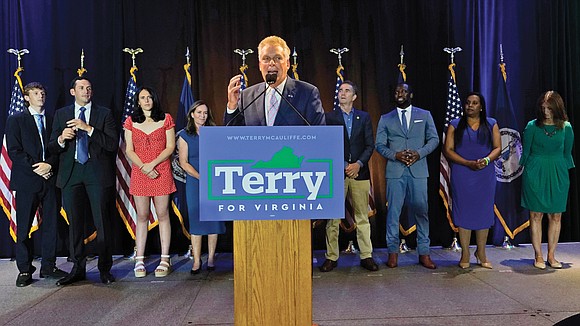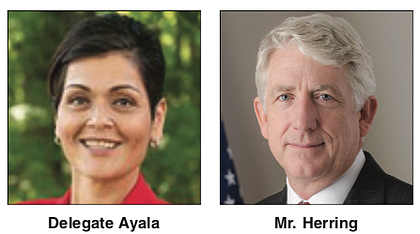Safe bets
More than 488,000 voters cast ballots in Tuesday’s Democratic primary, choosing former Gov. Terry McAuliffe, Delegate Hala S. Ayala and Attorney General Mark R. Herring to carry the banner in November
Jeremy M. Lazarus | 6/10/2021, 6 p.m.

After casting her ballot Tuesday at a North Side precinct, Justine Farmer said she felt she had to go with a familiar Democrat who could win in the fall.
That’s why the Richmond office worker said she voted for former Gov. Terry McAuliffe, the happy warrior of Virginia politics who appears to draw energy from being on the campaign trail.
“Don’t get me wrong. I’m torn,” Ms. Farmer said. “The two women in the race are crackerjack. I think either of them could do the job. But the Republicans are coming, and I think everyone needs to be realistic and go with a proven winner.”
She was far from alone in aiding the former governor in his quest for a second term.
The safe bet for many Democrats, the former governor claimed 62 percent of the vote in the Democratic primary to best four rivals for the nomination for governor and take on Republican Glenn Youngkin in the November general election.
Mr. Youngkin, who has never held elective office, ran a private equity fund in Northern Virginia and is pouring much of his personal fortune into his campaign.
The fall statewide Democratic ticket also will include Prince William Delegate Hala S. Ayala, an Afro-Latina who is the first woman Democrats have nominated to run for lieutenant governor, and Attorney General Mark R. Herring, who is running for a third term.
Backed by current Gov. Ralph S. Northam and House Speaker Eileen Filler-Corn, Delegate Ayala won 37.5 percent of the vote to outdistance five other candidates on the ballot. The runners-up included Roanoke Delegate S. “Sam” Rasoul, Alexandria Delegate Mark H. Levine, Norfolk City Councilwoman Andria P. McClellan, Northern Virginia NAACP activist Sean A. Perryman and lobbyist Xavier J. Warren.
Delegate Ayala will face off against the first Black Republican female to be nominated for lieutenant governor, Winsome Sears, a businesswoman and former delegate.
Mr. Herring, meanwhile, corralled significant Black support to outdistance his Black challenger for attorney general, Norfolk Delegate Jerrauld C. “Jay” Jones, who also had the backing of Gov. Northam. When the polls closed, Delegate Jones finished 13 percentage points behind the two-term attorney general, according to prelimi- nary results that show Mr. Herring won nearly 57 percent of the vote. Mr. Herring will face Republican Delegate Jason Miyares of Virginia Beach in the November general election.
While voting in the primary was described as light, more than 488,000 people participated in choosing the Democratic nominees, which state records indicate is second only to the 2017 turnout of more than 540,000 voters. Most primary voters chose to vote in-person on the day of the election, with only about one in four taking advantage of early voting. The Democratic turnout also dwarfed the Republican convention process in which only 39,000 people, or 12 times fewer, selected the nominees.
Mr. McAuliffe, who was the state’s popular chief executive from 2014 to 2018, could not run for re-election in November 2017 because of a state constitutional ban on a governor succeeding himself. Before entering the race, he considered other options, including a run for president.
After jumping into the Virginia race, Mr. McAuliffe outstripped his primary rivals in name recognition, endorsements and fundraising and was the clear favorite among virtually all population groups, including African-Americans, heading into the election.
Former Prince William Delegate Jennifer Carroll Foy, who portrayed herself as the champion of the working class, ran second, while Richmond state Sen. Jennifer L. McClellan, who pitched herself as an experienced leader, ran third. Lt. Gov. Justin E. Fairfax, who had been tarnished by two women’s accusations of sexual assault that he has denied and debunked, was a distant fourth in Tuesday’s voting, finishing ahead only of Prince William Delegate Lee Carter, who also lost his seat in the General Assembly.
Virtually certain that he would be the nominee, Mr. McAuliffe has wasted no time pivoting to the general election and going on the attack against his Republican rival.
Mr. Youngkin has claimed in ads that Mr. McAuliffe is a re-tread. In a post-primary message, he warned that Mr. McAuliffe “will default to the same political games he’s played his entire life. I’m confident that voters will not choose a recycled, 40-year political insider and career politician who pretends to be a businessman, who talks big but doesn’t deliver, and who failed Virginians the first time he was governor.”
Mr. McAuliffe, meanwhile, is working to portray Mr. Youngkin as an acolyte of former President Trump and an archconservative who would roll back progress.
Mr. McAuliffe, in his victory speech and in his first ad, said while he is campaigning to increase education funding, create jobs, boost racial equity and build on state progress, he said Mr. Youngkin is eager to ban abortion, pull the plug on health care expansion and restrict voting.
“I worked with reasonable Republicans to get things done,” Mr. McAuliffe said in the newly released advertisement. “Let me be clear. Glenn Youngkin is not a reasonable Republican,” but a Trump loyalist.
“Glenn Youngkin, literally, folks, has one policy, one an election integrity plan based on Donald Trump’s conspiracy theory about the 2020 election,” said Mr. McAuliffe, whose campaign has issued policy positions and plans on a wide range of issues, from broadband and transporta- tion to putting more attention on building up neglected and underserved communities.
Should Mr. McAuliffe win in November, he would only be the second governor since the Civil War to serve twice. Mills Godwin was the first, winning as a Democrat in the mid-1960s and as a Republican in the 1970s.
Analysts believe Democrats start with the advantage of having won every statewide contest since 2009. While Republicans have united around Mr. Youngkin, the party is still riven by fealty to Donald Trump. In Southside Virginia, a veteran Republican legislator was ousted based the challenger’s charges that the incumbent had not been vocal enough in supporting bogus claims that the 2021 election was stolen from the former president.
Virginia and New Jersey are the only states holding elections for governor this year. The results in Virginia could provide political insights ahead of the mid-term elections in 2022.
Historically, Virginia has elected a governor who is from the party that did not win the presidency, but in recent state and national elections, the Old Dominion has trended Democratic blue.







